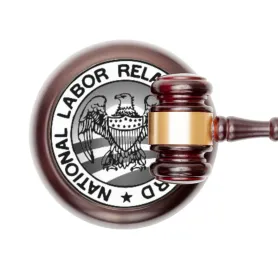-
The National Labor Relations Board (NLRB) General Counsel’s office issued a memorandum reiterating the rights of immigrant workers under the National Labor Relations Act (NLRA). Continuing its aggressive approach to expanding legal protections for workers and labor unions, the General Counsel’s office of the NLRB issued Memorandum OM 22-09, reiterating NLRB policy on workers’ rights to access the NLRB collective bargaining and remedial procedures regardless of immigration status, without fear of reprisals from their employers or the federal government. The memo includes a fact sheet (available in English and Spanish) that NLRB agents will provide to witnesses during investigations explaining how immigration status is not relevant to whether the NLRA has been violated, that information obtained during NLRB investigations is protected, and that a charging party or witness can ask the Board to seek immigration relief if it is necessary to protect employees who are participating in NLRB processes or exercising their rights under the NLRA. The memo is a follow-up to GC Memorandum 22-01, reiterating the earlier memorandum’s directive that NLRB agents should verbally advise a witness before taking their testimony that an individual’s immigration or work authorization status is not relevant to the NLRB’s investigation of whether the NLRA has been violated, and that the NLRB will not inquire about the witness’s immigration or work authorization status or share such status with Immigration and Customs Enforcement, the Department of Homeland Security, or other federal immigration agencies.
-
The U.S. Court of Appeals for the Third Circuit denied enforcement of an NLRB finding that an online magazine publisher violated the NLRA by posting a message on Twitter stating that workers would be sent “back to the salt mine” if they tried to unionize. FDRLST Media, LLC v. NLRB, Nos. 20-3434 and 20-3492 (May 20, 2022). The Federalist is an online magazine. Its publisher, upon learning that the unionized employees of Vox Media, a company unrelated to The Federalist, had begun a work stoppage, issued the following public tweet from his personal account: “FYI @fdrlst first one of you tries to unionize I swear I’ll send you back to the salt mine.” The tweet was not directed at The Federalist’s employees, but it was seen by at least one The Federalist employee. An unfair labor practice (ULP) charge was filed, alleging the tweet was a threat of retaliation for any The Federalist employee contemplating union organizing (there was no indication of any such ongoing activity). Not surprisingly, the NLRB determined the tweet was a violation of the NLRA. The Federalist sought court review.
The Third Circuit rejected the Board’s decision, finding a reasonable employee would not have considered the tweet a threat when viewed in its context. The Court pointed to the fact that The Federalist regularly makes commentary on a variety of political issues, including labor relations, and that the message was not sent directly to the employees but to the general public on Twitter, a public platform that promotes exaggerated and sarcastic speech. The Court also found the “threat” as applied to The Federalist employees was “farcical” and “as bizarre as it is comical.” Further, because the tweet was made in response to a media report that the employees for Vox Media walked off the job during union contract negotiations, the Court said it was more likely The Federalist employees would view the tweet as a barb at a rival publication, as opposed to a serious threat to their employment.
-
The Board held employers cannot restart their employees’ attempt to decertify a union. Geodis Logistics, LLC, 371 NLRB No. 102 (2022). The case arose from an employee’s decertification petitions filed in 2018 and 2019 to oust the United Steelworkers as the bargaining representative for a group of production workers at Geodis Logistics, LLC. A NLRB Regional Director dismissed those petitions after a ULP investigation determined the employer provided improper help to the petitioner in those decertification cases. After the employer settled the ULP charges, it requested the NLRB reinstate the decertification petitions. The NLRB, adopting a Regional Director’s decision, rejected the employer’s request, finding it would open the door for employers to manipulate the NLRB’s processes by unlawfully assisting employees with decertification petitions, settling any ULPs that arose from the unlawful assistance, and compelling the NLRB to reinstate the decertification petition. The NLRB further pointed to the structure of the NLRA, noting that Section 9(c) establishes separate procedures for employees to file decertification petitions and employers to force elections to test an employer’s majority status.
-
Video game testers at Activision voted to unionize, a first in the North American gaming industry. Activision Publishing, Inc., 18-RC-289570. Quality Assurance employees at Activision subsidiary Raven Software voted 19-3 in favor of being represented by the Communications Workers of America (CWA). The group, known as the Game Workers Alliance, first organized in January 2022 in response to layoffs at Activision, but a dispute between the employer and the union at the NLRB over which employees should be allowed to vote prolonged the election for several months. Although the tech industry has been unionizing rapidly over the past year, the CWA will be the first to represent employees at a listed video game company in North America. The union campaign comes during a transitional period for Activision, as Microsoft plans to buy the video game publisher by June 2023. Some labor experts say the sale would make it difficult for other groups at Activision to unionize due to likely changes in organizational structure.
-
Senate Democrats proposed legislation that would ban tax deductions for expenses incurred by companies opposing union organizing. The No Tax Breaks for Union Busting Act proposes that employer spending on “anti-union activity” qualifies as political speech under the tax code and cannot be deducted from companies’ taxes. The bill does not differentiate between lawful and unlawful activities and would require businesses to report spending on union organizing campaigns to the Internal Revenue Services. A 2019 Economic Policy Institute report found that employer spending on communication consultants during union organizing campaigns could be as much as $340 million annually. With no Republican co-sponsors, the bill is unlikely to advance to the Senate floor for a vote.
Thomas V. Walsh and Nicholas A. Scotto authored this article








 />i
/>i

